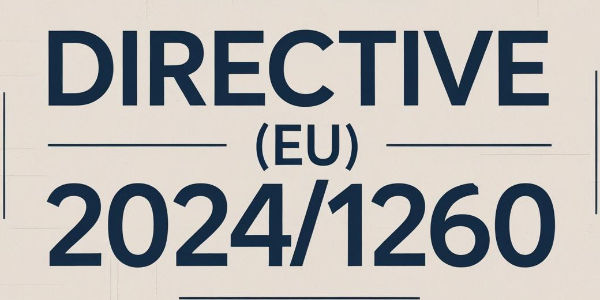DIRECTIVE (EU) 2024/1260 OF THE EUROPEAN PARLIAMENT AND OF THE COUNCIL of 24 April 2024 on the Recovery and Confiscation of Assets
- KW KRUK I WSPÓLNICY

- Jul 16, 2025
- 2 min read
The initial proposals for introducing a directive on the recovery and confiscation of assets emerged on 25 May 2022, when the European Commission submitted a proposal for its establishment. The key argument for implementing this regulation was the need for an effective fight against organized crime, which poses a significant threat to the security of the European Union. Criminal organizations continually develop advanced money laundering methods, justifying the necessity to deprive them of illegal profits to disrupt their activities and infiltration into the legal economy.
On 24 April 2024, the European Parliament and the Council of the European Union adopted Directive (EU) 2024/1260. The directive aims to harmonize and strengthen national regulations concerning the identification, securing, management, and confiscation of assets derived from criminal activities. It imposes an obligation to establish specialized national bodies responsible for asset recovery and cooperation within EU networks and databases. The directive came into force on 2 May 2024, and Member States are required to implement it by mid-2026.
The objective of the directive is to counteract crimes, including economic and financial crimes. The regulation is designed to enable effective responses in situations where perpetrators attempt to conceal or transfer assets derived from illegal sources.
One of the key elements of the new provisions is the extension of the ability to temporarily secure assets, even at an early stage of proceedings, to prevent their division, dispersal to various locations, or concealment. Member States must provide tools enabling the confiscation of assets not only in the case of a conviction but also in exceptional situations, such as the death or disappearance of a suspect, thereby avoiding impunity and effectively recovering assets derived from crime.
A new element is the introduction of a mechanism for the confiscation of assets of unexplained or difficult-to-determine origin. The directive allows the authorities of Member States to confiscate assets if their value significantly exceeds the known legal income of the perpetrator and circumstances indicate a connection to criminal activities. Although such a system already exists in some countries, its formal inclusion in EU law represents a significant shift towards a more repressive approach to combating unlawful enrichment.
An important aspect of the regulation is also the issue of securing confiscated assets. Member States are obliged to establish structures responsible for the effective and transparent administration of assets, allowing for the preservation of their economic value. Additionally, in certain situations, it will be possible to allocate seized funds for social purposes or compensation for victims of crimes.
Directive 2024/1260 on the recovery and confiscation of assets constitutes a significant step towards deepening the integration of security area in the European Union. Its aim is to enhance the effectiveness of law enforcement actions and to limit organized crime by depriving and hindering the acquisition of financial benefits.






Comments